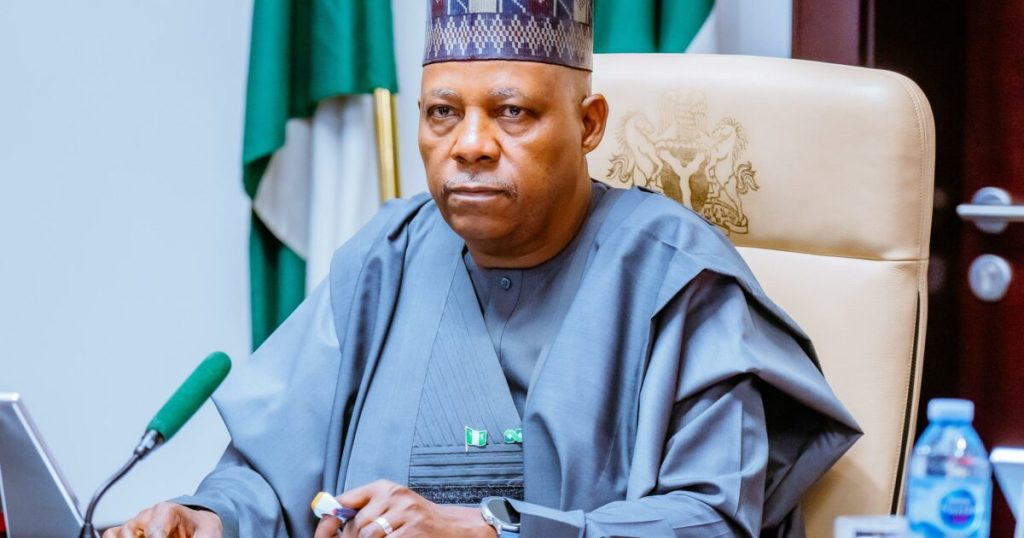Vice President Kashim Shettima, represented by his Special Adviser on Economic Matters, Dr. Tope Fasua, addressed the 32nd Annual Meetings of the African Export-Import Bank (Afreximbank) in Abuja, highlighting the bold economic reforms undertaken by President Bola Tinubu’s administration. He characterized these reforms as among the most significant in Nigeria’s history, designed to promote transparency, resilience, and sustainable economic growth. Shettima emphasized the proactive nature of resilience, stating that it requires meticulous planning, construction, and protection. He outlined several key initiatives, including the unification of the foreign exchange market, the removal of fuel subsidies, the launch of a national compressed natural gas transition plan, and the initiation of major infrastructure projects such as the Lagos-Calabar Coastal Highway and the Eastern rail corridor.
The Vice President underscored the rationale behind these reforms, explaining that the unification of the exchange rate aimed to eliminate multiple foreign exchange windows, thereby restoring transparency and boosting investor confidence. The removal of fuel subsidies, while challenging, was presented as a necessary step to curb financial leakages and redirect resources towards crucial areas like social protection and infrastructure development. Furthermore, the administration introduced reforms in the oil sector, implementing real-time export tracking and strengthening revenue assurance through the Petroleum Cargo Declaration Scheme. Support for small and medium enterprises (SMEs) was also restructured through digitized platforms aligned with the African Continental Free Trade Area (AfCFTA).
Shettima pointed to early positive indicators resulting from these reforms, projecting GDP growth of 4-4.5% by 2025, stabilizing inflation, and strengthening reserves. He attributed these improvements to the economy’s transition to a firmer and more diversified foundation. Acknowledging Afreximbank’s significant contributions to Nigeria’s development, he noted that the country remained the bank’s largest beneficiary, having received over $52 billion out of the bank’s total disbursement of over $100 billion across Africa. He highlighted several key projects supported by Afreximbank in Nigeria, including the African Trade Centre in Abuja, the African Medical Centre of Excellence, Quality Assurance Centres in Kaduna and Ogun States, a $300 million export-manufacturing initiative, and a $3 billion intra-African petroleum trade facility. He described these investments as strategic contributions to resilience, sovereignty, and shared prosperity.
Shifting from resilience to renewal, Shettima urged African nations to move beyond merely weathering economic storms and focus on actively shaping their future. He advocated for the mobilization of blended finance, the deepening of regional value chains, the institutionalization of digital trade systems, and the strengthening of key financial institutions. He emphasized the importance of not simply waiting for the future but actively building it, reiterating Nigeria’s commitment to collaborating with Afreximbank and other African nations to advance the continent’s development goals. He declared Nigeria’s readiness to lead, collaborate, and deliver on its commitment to continental progress, formally opening the 32nd Annual Meetings of Afreximbank.
Central Bank of Nigeria Governor, Olayemi Cardoso, echoed Shettima’s sentiments, reaffirming the bank’s dedication to rebuilding institutional trust and bolstering confidence in Nigeria’s monetary and financial systems. He emphasized consistency, clarity, and credibility as the cornerstones of long-term resilience, stating that the past year had been dedicated to restoring market confidence and strengthening policy implementation. Cardoso praised Afreximbank as a vital continental force for innovation, courage, and continuity, highlighting its crucial role in supporting SMEs, financing trade, responding to crises, and championing African financial sovereignty through initiatives like the Pan-African Payment and Settlement System (PAPSS). He emphasized the importance of proactively engineering resilience through strategic foresight, crisis preparedness, transparent communication, and robust governance, urging Africa to move beyond simply surviving shocks to shaping new global models and leading with confidence.
Afreximbank’s Senior Executive Vice President, Denys Denya, reinforced the need for urgent action to fortify Africa’s home-grown institutions against increasing global volatility. He warned of resurfacing opposition, similar to that faced during the bank’s inception in the 1990s, now seeking to undermine African progress in new ways. He stressed the importance of intentional aspirations, firm convictions, resolute actions, and a united purpose for Africa. Denya reiterated Afreximbank’s unwavering support for member states navigating shocks and reforms, highlighting the urgency of prioritizing industrialization on the continent. He framed the current moment as a critical juncture for Africa to assert its economic independence and chart its own course towards sustainable development and prosperity.


